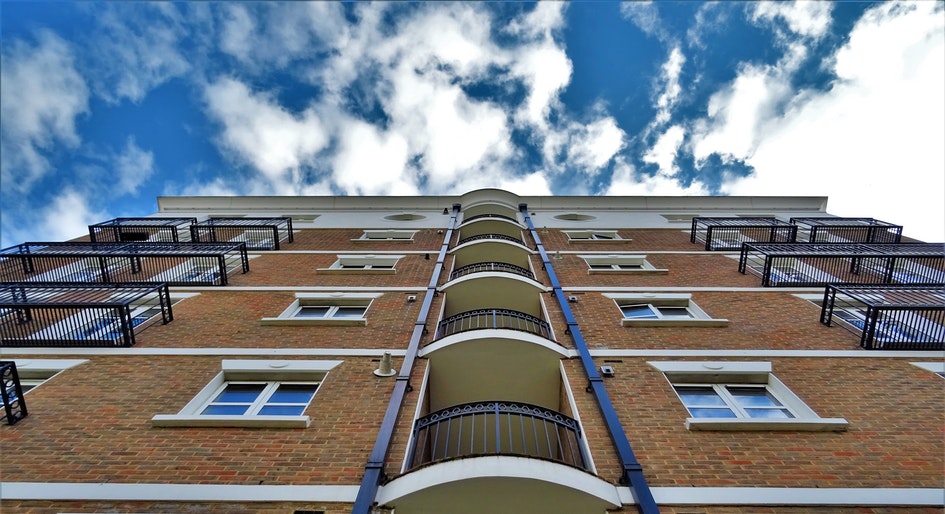Under COVID-19-induced pressure, investors, lenders and public markets are signalling a preference for multifamily assets. JLL’s newly released 2020 midyear overview salutes the asset class as the top attractor of investment dollars in Canada’s commercial real estate market during the first half of this tumultuous year, with $3.4 billion in deal value almost on par with the comparable period in 2019.
Toronto, Montreal and Edmonton account for more than half of that activity. While total sales value of $670 million in Toronto and $580 million in Montreal lagged the level hit at midyear 2019, the average price per suite held steady in Toronto and climbed significantly for both downtown and suburban properties in Montreal.
Toronto sales to date in line with five-year average
Following two years of record sales value in 2018 and 2019, JLL analysts suggest Toronto is now more in line with the five-year average. By some counts, April, May and June 2020 stand in stark contrast to recent quarters. Colliers reports a 66 per cent decline in sales volume and a 67 per cent drop in the number of suites traded relative to Q2 2019. More optimistically, an average price per suite of $276,000 — resting just slightly below the Q1 2020 average — was 8 per cent higher than the Q2 2019 average.
The resoundingly largest trade of the quarter came right at the end of June with Timbercreek Asset Management’s $143-million purchase of a nine-building, 509-unit portfolio from Flagship Property Ventures. A per-suite price of $281,670 exceeded the year-to-date average, but fell well short of the $414,518 per unit Equiton Partners shelled out for a 48-unit building in pre-pandemic March.
Since then, some new competition has arrived at the high end of the market as investor-owners switch from offering condominium units for short-term rental to seeking longer tenures. However, the economics of high-end, purpose-built stock, mostly built over the past 15 years, have not significantly diminished. Colliers pegs average rent at $2,412 per month or $3.28 per square foot — nudging down 0.03 per cent since Q2 2019 — with a vacancy rate of 1.8 per cent.
Even with developers of purpose-built rental more active than they’ve been since the 1970s, the approximately 13,500 units currently under construction throughout the Greater Toronto Area aren’t expected to make a dramatic dent in a market with an overall vacancy rate below 2 per cent. COVID-19 related construction slowdowns should also serve to solidify incumbent landlords’ position for awhile yet. Q2 saw the arrival of 315 new units in midtown Toronto, but Colliers projects some of the additional 2,750 units scheduled for completion this year will be delayed.
Prominent acquisitions in Montreal and Edmonton
Two prominent acquisitions of new purpose-built product helped push up the average price per suite in the Montreal market during the first half of 2020. Manulife’s $105-million purchase of 300 suites in phases three and four of the EQ8 development in the downtown core equated to $350,000 per suite, while CAPREIT paid $43.5 million, or $388,000 per suite, for a 16-storey, 112-unit building in suburban Brossard.
“Looking ahead, we will continue to focus on purchasing newer properties that enhance our asset base,” says Mark Kenney, CAPREIT’s president and chief executive officer. “These properties generate higher rents, attract stronger residents, require much less capital spending, and serve to further strengthen and diversify our overall portfolio.”
Meanwhile, $495 million in multifamily deal value in Edmonton already surpasses total multifamily sales in each of 2017, 2018 and 2019, and represents 49.5 per cent of the value of all investment trades in the city during the first half of the year. Notably, Centurion Apartment REIT has tripled its Edmonton holdings in 2020 — beginning with a $205-million, four-tower acquisition in January that added 832 suites and 39,000 square feet of commercial space, followed by a June deal for a 100-unit newly constructed mid-rise building.
“We are excited to see our Edmonton portfolio growing at such a rapid pace,” notes Greg Romundt, Centurion REIT’s president and chief executive officer.
Vancouver cap rates remain lowest anywhere
Looking to the three other major Canadian markets JLL surveys, multifamily deals totalled $380 million in Vancouver, $115 million in Calgary and a modest $40 million in Ottawa. Across Canada, multifamily cap rates continue to be the lowest of any real estate asset class. That factor, coupled with shortage of supply, is also believed to be playing into low deal volume.
Still, prospective investors are also viewing real estate with an eye to the yield spread over 10-year Canada bonds — now the widest of at any time in the past 30 years — which CBRE pegs at 512 basis points for the all-properties national average. JLL notes that “buyers and sellers have been far apart on pricing” and, due to the COVID-19-related pause, with few comparable deals to look to for guidance.
“In all major markets average multifamily cap rates are around 100 basis points lower than office or industrial,” JLL analysts observe. “With rent collection generally in the range of 92 to 99 per cent depending on the owner, multifamily is proving its resilience in a downturn. Consequently, vendors are offering no ‘COVID discount’ on pricing.”
Vancouver’s multifamily cap rates are the lowest found anywhere, calculated in the range of 2.5 to 3 per cent for Class A high-rise properties. Thus far, JLL projects 2020 sales volume is on track to match last year’s level, but it’s well below the five-year average. The average price per suite — which Colliers pegs at $430,600 across the metro region and at $481,100 in the city core for Q1 2020 — remains relatively steady.
The provincial non-profit housing provider and developer, BC Housing, has plans to bring more affordable stock to the Vancouver market via conversion. The agency was Canada’s top hotel investor in the second quarter, acquiring two properties in Vancouver and two in Victoria. With a $55-million price tag, the deal for the 110-room Howard Johnson Downtown Vancouver was the priciest, but the overall outlay of $108 million delivers 400 affordable units at an average of $270,000 per suite.
Some advantages relative to other sectors
“If hotels continue to struggle over the foreseeable future, this could be a blueprint that other housing agencies across Canada follow,” JLL analysts speculate.
Conversion to student housing is another potential option flagged for hotels. Meanwhile, seniors housing emerges from the pandemic carrying a different set of baggage with owner/operators and their investors facing scrutiny and various inquiries pending. “There could be important structural changes affecting this sector,” JLL analysts advise.
Governments moved quickly to impose COVID-19-related restrictions on rental housing, with most provinces placing a temporary halt on the majority of eviction proceedings as early as April. However, it’s also perceived that measures like the Canadian Emergency Relief Benefit (CERB) have flowed through to landlords far more effectively than Canadian Emergency Commercial Rent Assistance (CECRA) for the office and retail sectors.
That’s reflected both in a lower level of rent default and a higher level of confidence from public markets and lenders. Industrial and multifamily REITs have experienced the least erosion in unit value during the crisis, with multifamily REITs down about 15 per cent versus nearly 30 per cent for office and retail REITs. Multifamily REITs also report upwards of 90 per cent rent collection versus less than 70 per cent for retail REITs.
“Moving into Q3, lenders are increasingly open for business after largely halting new commitments in Q2,” JLL reports. “Allocations continue to view multifamily, industrial and essential retail (grocery-and pharmacy-anchored) favourable, while lenders are reluctant to finance hotel and non-core retail.”





